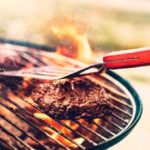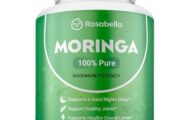Get these Fourth of July food safety tips from the USDA for a happy and safe holiday. This is high season for summer grilling, and there are some things you need to know to keep family and guests healthy. Food safety starts with handling food. If you purchased frozen food, especially meats, for your party, make sure that you thaw beef, poultry, or fish in the refrigerator, in cold water, or in a microwave. Never thaw food on the counter. And remember that when thawing with cold water or the microwave oven, the food must be cooked immediately. Check the package to see if the food is pre-browned or browned but not fully cooked. Some of these foods can seem cooked, but they must be treated as raw food and cooked to a safe final internal temperature. Any product labeled “Cook and … [Read more...]
Fourth of July Food Safety Tips From the USDA
The USDA is offering Fourth of July food safety tips so you can have a great celebration and offer safe food for your family and friends to enjoy. It's easy: just follow the four steps of clean, separate, cook, and chill. When you are serving guests of varying ages and health concerns, it's very important to make sure that the food at your party or gathering is wholesome and safe. That means you need to follow certain steps in the kitchen to the letter. They are: CLEAN. Wash your hands and surfaces such as countertops often. Hands should be washed for 20 seconds with clean water and soap. (Sing Happy Birthday to You twice for accurate timing.) If no running water is available, use hand sanitizer or moist towelettes that contain at least 60 percent alcohol. SEPARATE. Separate … [Read more...]
Celebrate the Fourth of July Without Foodborne Illness
Celebrate the Fourth of July this year without foodborne illness, with tips from the USDA about safe grilling. There are inherent risks that come with cooking in hot weather too. First, always wash your hands before cooking and handling and serving food. Handle raw meat with care, since it can be contaminated with pathogen bacteria such as E. coli, Salmonella, Listeria monocytogenes, and Campylobacter. Keep raw meats away from foods that are eaten uncooked such as raw fruits and vegetables. When you form hamburgers or season steaks, using a separate cutting board and plate. And wash your hands thoroughly with soap and water after touching uncooked meat and poultry. If you marinate the meat or poultry, keep the used marinade away from other foods, and discard it when you put the … [Read more...]
Fourth of July Food Safety Tips From the USDA
The USDA is offering food safety tips for the Fourth of July holiday. We all know the basic drill: cook properly, clean everything, sanitize often, and avoid cross-contamination, but it's a good idea to review these rules before you have lots of guests to feed. First of all, hot Fourth of July summer weather will play a part in food safety. As the temperatures rise, the risk for foodborne illness goes up. Not only do bacteria multiply more quickly in warm weather, but when the ambient air temperature is above 90°F, you must get prepared and cooked food into refrigeration after just one hour, not the usual two hours. To start, always wash your hands with soap and water for at least twenty seconds before and after cooking, and especially after handling raw meats, poultry, eggs, and … [Read more...]
Fourth of July Food Safety Tips From the USDA to Stay Safe
These Fourth of July food safety tips from the USDA will help you and your guests stay safe to enjoy the long holiday weekend. Follow basic food safety tips, and add those that apply when you are cooking and eating outdoors, especially in hot weather. First, start by always washing your hands with soap and water before you start cooking and before you eat. Learn how to properly wash your hands. Second, keep raw meats, poultry, seafood, and eggs away from foods that are eaten uncooked, such as produce and salads. Use separate and different colored cutting boards for meats and for fresh fruits and vegetables, and yet another for cheeses, which can be contaminated with bacteria. If you are grilling outdoors, follow the rules for safe grilling, including not grilling inside, in a … [Read more...]
Fourth of July Food Safety Tips From the USDA to Avoid Illness
These Fourth of July food safety tips from the USDA will help you avoid foodborne illness this holiday weekend. Because more people are staying at home and cooking at home, these tips are important. Dr. Mindy Brashears, the USDA's Under Secretary for Food Safety said in a statement, "Foodborne illness can increase during summer because of the warmer temperatures and extended time spent outside. You may not be grilling at the park this year, but instead you may be grilling at home. As we celebrate this Fourth of July holiday, I encourage consumers to use food safety steps to reduce their risk of illness." First, avoid cross-contamination between raw meats and poultry and foods that are eaten uncooked. Wash and sanitize all surfaces and utensils after they touch raw meats and … [Read more...]





